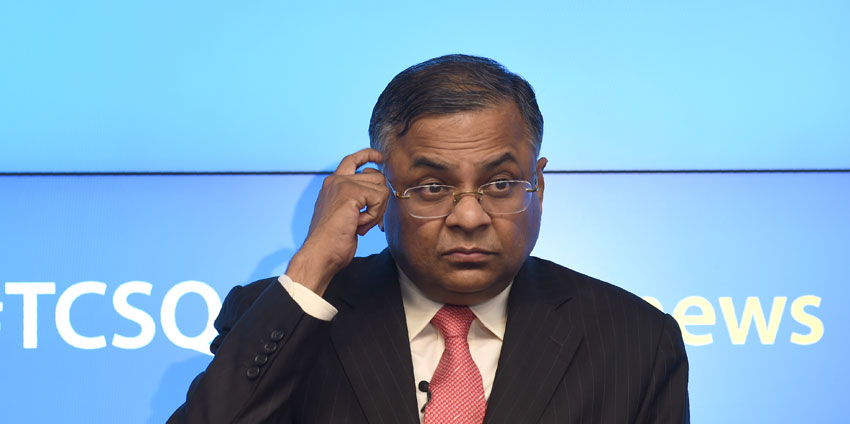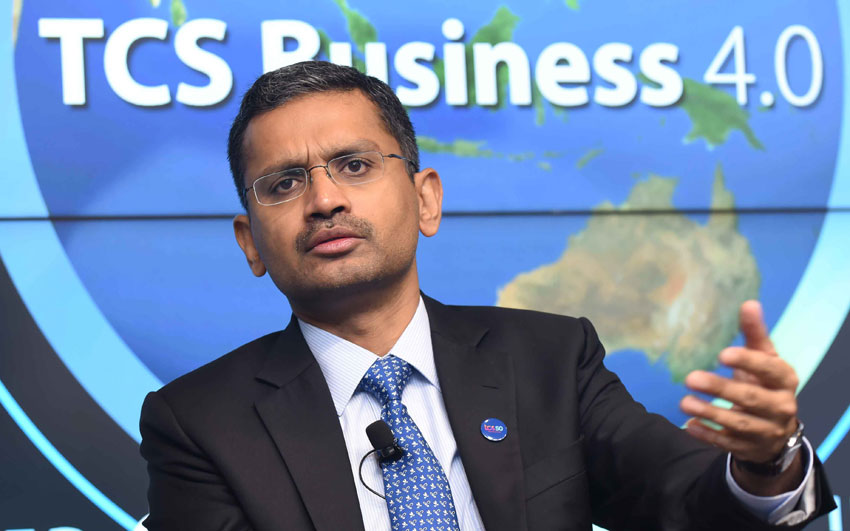TCS Wins: U.S. Jury Rules in Favor Over Alleged Discrimination
Rajesh Gopinathan, CEO and managing director of Tata Consultancy Services (TCS) speaks during a press conference announcing the Q1 financial results in Mumbai, July 10. (AFP/Getty Images)
In a significant victory for the Indian IT outsourcing industry, a California jury unanimously sided with the Tata Consultancy Services (TCS), saying the Indian consulting major did not discriminate against non-South Asian workers in the U.S. as alleged in a lawsuit, writes Yoshita Singh.
According to a report in legal news portal law360.com, the unanimous nine-member jury found in an Oakland, Calif. Court, Nov. 28, that TCS did not have a “pattern or practice” of intentionally discriminating against non-South Asian workers due to their race or national origin.
The verdict came after one day of deliberations, ending a trial that began Nov. 5, over a class action lawsuit brought by three former TCS employees, Christopher Slaight, Seyed Amir Masoudi and Nobel Mandili, who claimed in the suit they received fewer work opportunities and were eventually fired because of their races and national origins.
“We have always maintained, the claims made in this case were baseless and we are gratified that the jury agreed,” a TCS spokesperson said in an email response to PTI.
The TCS spokesperson said in the statement that the company’s success “rests on the talents, expertise and deep industry knowledge of our employees, who help our customers in their growth and transformation journeys. So, the decisions we make about the hiring and retention of employees are based purely on their capabilities and fit in serving our customers’ business needs.”
“Irrespective of their background or national origin, we will continue to invest in our people, provide ongoing digital training and empower them to succeed at the TCS and, more importantly, enable our customers’ success,” the statement added.

The report said that Daniel Kotchen, attorney for Slaight, Masoudi and Mandili, presented data showing that the company has fired fewer than one percent of its South Asian employees, who are mostly Indian, in the U.S., compared with 10.6 percent of its non-South Asian employees.
The suit also alleged that TCS let go of 78 percent of its non-South Asian workers who were taken off job assignments, or “benched” from work, between 2011 and 2014, while only 22 percent of benched South Asians were fired, even though they made up half of the company’s U.S. workforce.
The TCS executives testified at trial that the company had recently raised its year-over-year retention rate to 82 percent from 69 percent and that the company had increased the number of U.S. residents it hires and retains, the report said.
It added that in closing arguments, Tata’s counsel Terry Garnett of Loeb & Loeb LLP, argued that the company’s employment data show there’s been a 400 percent increase in local hires since 2011. Garnett also said at trial that most of the workers who alleged they had been fired were let go for refusing to relocate for a job.
A report in the East Bay Timesquoted Garnett as saying that the jury unanimously ruled that TCS “did not discriminate on the base of race or national origin.”
The TCS spokesperson added that the U.S. is the world’s business and technology leader and very important to the company, which has been operating in the U.S. market for over 40 years.
“Skilled American workers are critical to the success of the U.S. business and to the nation’s economic success, and we will continue to invest heavily in the country’s workforce, academic alliances and our extensive youth STEM education initiatives,” the spokesperson said.
The verdict came as the Trump administration is doubling down on immigration and its tough stance is impacting companies from hiring and retaining foreign workers on the H-1B work visas, which is the most-sought after among Indian IT professionals.


